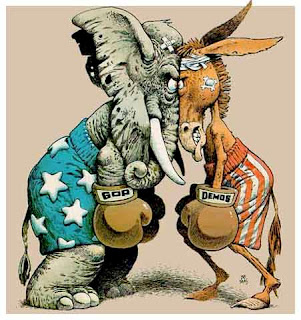
Most of the Republicans who spoke on Wednesday about their recent victories in the House and the Senate, all insisted: The American people gave them a mandate. John Boehner was so moved by it, that he cried.
Pollsters, those who ask the questions and crunch the numbers, believed that the "whipping" would be greater. There's no denying the beating that Democrats took in the House--but, in the Senate, they survived. They weaker now, but they survived. There was a 10% likelihood that they wouldn't. Many pundits felt that the Senate, as well as the House, would fall to the Republicans. They were wrong. To be sure, Democrats received a spanking in the Senate but clearly not a whipping.
Their defeat is easily explained: Many Democrats who voted in the 2008 election sat out this time. This clearly made the difference. They were young, and they were mostly minority. You might reason then: It wasn't the Republicans or the Tea Party who defeated Obama and the Democrats, it was their base. It's hard to say that the low turn out for this group was all about the economy, and not about the inability of Democrats to pursue a progressive agenda, or change how the system works. In the days ahead, Republicans will characterize their victory as a referendum on Obama, on his agenda, and on Democrats generally.
Once again, I think pundits are misreading the tea leaves: They're insisting that Republicans will have to abandon their obstructionist tactics and actually do something. "Surely the Republicans will cooperate now. Surely they want a record on which to run in 2012." I admit: I didn't anticipate the American people falling for this tactic. But now, I'm beginning to take Republicans at their word, whether they're Tea Party Republicans are old-brand Republicans. Early on, these old-brands made clear their position: They said, unequivocally, that they wanted Obama to fail, and, to date, they're making good on their words. With their new congress, Republicans are now threatening the unthinkable, not to compromise, and to make Obama a one-term president.
If I wasn't a believer before, I am now. A
true believer. Why should Republicans abandon what has been working for them? Rand Paul, Tea Party candidate, and now Senator-elect, has put Republicans on notice. In his victory speech, he said, essentially, the Tea Party will take no prisoners, and they won't surrender. One thing is clear: It's the Tea Party that feels it has a mandate from the people, and not the whole of the Republican Party. Rand Paul has thrown down the gauntlet. For the Republican establishment the message is unambiguous: The Tea Party is now in charge.
It's Tea Time. You'll either do it our way, or we'll show you the highway.
What we have, then, is a prescription for gridlock. The Tea Party, to keep its promises, will have to do something to give the appearance of reducing the size of government. For one, they will attempt to repeal health-care reform, which will, of course, fail. For two, they will attempt to whittle away at the size of the Federal government. Some Tea Party folk have actually gone so far as to call for the abolishing of the Education Department and the EPA. Were this to pass, it would make the Koch brothers happy, as well as some other wanna-be polluters. Republicans may want this, too, but they're not under any pressure to deliver. Expect some infighting on these issues.
Here's my prediction: The Republican Party will soon be obsolete. It will be replaced by the Tea Party. The Tea Party will be the Republican Party on steroids--more intransigent, more conservative, more aggressive, and less likely to reach across the aisle, if at all. Already the Tea Party has made significant inroads--to be followed by one incursion after the other, until they've replaced the Republican establishment.
Before the curtains were drawn on the Democrats, Obama managed to pass two key pieces of legislation (health-care reform, and wall street reform). Mid-term elections, traditionally, present incumbent parties a real challenge to hold seats in either house, regardless of party. It explains one of the reasons for the much-criticized haste to pass legislation before the mid-term, and the reason Obama and the Democrats didn't tackle other major legislation, such as immigration reform (which wasn't popular anyway with the electorate), and is now, after the recent Republican victories, on indefinite hold.
I firmly believe that the reason that jobs weren't pursued with all the vigor that the president and the congress could muster was the perception that the financial sector needed rescuing first to avoid a depression. They may have believed, too, that the much-lauded stimulus bill (which economist agreed was too small) would accomplish that task--but job losses came faster than anticipated, and the stimulus managed only to keep the losses from becoming a tsunami, merely replacing jobs that were being lost, rather than creating new ones.
To make matters worse: Votes passed in the Democrat-majority House were in-boxed in the Senate--because, it was explained, the votes necessary for passage didn't exist. The Democrat caucus gave Democrats 60 votes to defeat filibusterers in the Senate, but "blue-dog democrats (Republicans in my book)," and moderates, may have kept many of these bills from going forward, especially with that nasty mid-term election on the horizon. As an aside:
Blue Dogs were unseated in the recent race with a vengeance, twenty-four in all.
Here's a thought: Should progressives start their own movement within the Democrat Party to move it more to the Left? I say: Why not? The country can't be more polarized than it is now. This would be one way to exact change (to assure accountability, maintain transparency, and take the money out of politics) without armed conflict, that second-amendment remedy, once suggested by Tea Party candidate, now defeated, Sharron Angle.
Undeservedly, Obama and the Democrats were stand-ins on Tuesday for Bush and the Republicans. Democrats took the beating that should have gone to Republicans. You can say that the previous mid-term elections and Obama's rise to the presidency was payback for what the Republicans did during their tenure, but, in my view, it wasn't enough. I can recount several things, from the two wars in which we're stilled mired--not so much in Iraq as in Afghanistan--to the economic woes this country still faces, all having their genesis under Bush. So to see Republicans rewarded for their failings is the ultimate slap in the face to Democrats. It further crystallizes my belief that the electorate still doesn't get it.
Will Obama abandon his liberal agenda, move closer to the center, and lean Right? It's no secret that the country is more conservative than liberal, but this hasn't always translated into political capital for Republicans, who, this time around, garnered more of the independent votes than did Democrats.
Rush Limbaugh, the oracle of the Right, states it something like this: "Where is there room for any compromise with Marxism, or socialism, or liberalism? Where is there compromise with evil."
Bullying is in. Issuing threats is in. Hard-line resistance is in. Statesmanship is out. Compromise is out. Working together is out. The Democrats are in a brawl, a bar fight, and they still want to characterize it as a misunderstanding. They say: The Republicans down deep want to work with us. They just don't know it yet.
Unless Republicans are in power, they will hold this nation and its economy hostage. It's clear, at least to me, that what they're after is a one-party nation, where they control both houses of congress and the presidency in perpetuity. We have moved into an era of one-party politics, where the Republican opposition party is just that--in complete opposition to any efforts to reach across the aisle to advance legislation, unless it initiates the legislation, unless it shapes the legislation without interference or input from the opposing party.
If you doubt me, listen to their rhetoric: It's defiant, definite, and deliberate, the four "D's" of a destructive policy.
 If the title of this piece seems a bit out of character for me, well, you'd be right: it is. It's the reason why I put it in quotations. I'll come back to the title in a bit, but first I have a few observations I'd like to share:
If the title of this piece seems a bit out of character for me, well, you'd be right: it is. It's the reason why I put it in quotations. I'll come back to the title in a bit, but first I have a few observations I'd like to share:







